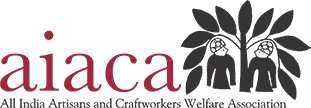
The handloom and handicraft sectors in India have deep cultural and historical significance. They have evolved from generations of artisans producing objects of utility and decoration primarily by hand, with the help of simple tools. The objective of making these sectors sustainable and viable, led to the idea of forming an apex body for the craft industry. It was a result of various discussions between some of the eminent personalities of this sector who have also been members of AIACA’s board, especially William Bissell, the Managing Director of Fabindia and Laila Tyabji, the Chairperson of Dastkar.
While many individuals and organizations in this sector, over the years, have been engaging with the government on various issues such as the need to reform unclear policies, tax regulations regarding setting up and running a crafts-based business, lack of access to credit and social security services for craft workers and various other issues, there has been little impact due to the isolated nature of these initiatives. The heterogeneous, dispersed and unorganized nature of production in the crafts sector made it difficult to translate sectoral growth or interventions into improved living standards for artisans.
The rapidly changing economic scenario within India required pro-active research in the sector to support policy-making for enabling craft workers to deal with the changes and challenges as well as to take advantage of domestic market opportunities created by economic and trade liberalization.
To address these concerns there was a clear need for a membership-based apex body that would represent craft workers at the national level, serving to help them articulate their needs and advocate favorable policies for the sector. This body aimed to bring together private businesses, non-profit organizations and cooperatives working in the crafts sector who were all affected by the lack of effective policies and an enabling environment for their growth.
Thus, the All India Artisans and Craftworkers Welfare Association (AIACA) commenced in March 2003 as an informal association of craft NGOs and producer organizations spread across India. After operating as an informal association for one year, AIACA was formally registered under the Societies Registration Act on 30th January, 2004.
AIACA’s experience in the initial years led to the understanding that providing policy inputs was not adequate as the critical needs for most of the producer groups was access to markets and technical inputs. Hence, the focus of AIACA’s work expanded to create Enterprise Support Programmes that would assist craft producers to become commercially sustainable organizations.
